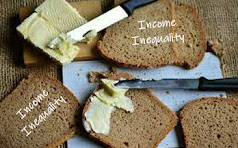In our last post, we explored possible reasons for the Democratic Party’s difficulties in the recent Virginia elections. Former Governor Terry McAuliffe lost to political newcomer Glenn Youngkin in his bid for another gubernatorial term and Republicans scored major gains in the Virginia legislature. Media predictions abounded that Virginia foreshadowed big Democratic losses in the 2022 midterms and potentially in the 2024 presidential election.
It’s the Income
Inequality, Stupid
We assert that a credible, though not infallible, argument exists that if Democrats focus on waging war on behalf of the middle and working classes they can prevail in the upcoming elections. By taking executive
Democrats must make plain that since
1980 –the beginning of the Reagan
Revolution – the top one percent of
the population has increased its share of the nation’s wealth from ten percent
to 20%, a trend that continues unabated every year. The pandemic only
made it worse. The tax burden on the rich has been lowered, with no concomitant
increase in jobs or other economic benefits for the middle and working classes.
top one percent of
the population has increased its share of the nation’s wealth from ten percent
to 20%, a trend that continues unabated every year. The pandemic only
made it worse. The tax burden on the rich has been lowered, with no concomitant
increase in jobs or other economic benefits for the middle and working classes.
This development has been well
documented in books like The Triumph of
Injustice: How the Rich Dodge Taxes and How to Make Them
Pay by Emmanuel Saez
and Gabriel Zucman and Capital and
Ideology by Thomas Piketty. These works demonstrate the degree to
Rich Dodge Taxes and How to Make Them
Pay by Emmanuel Saez
and Gabriel Zucman and Capital and
Ideology by Thomas Piketty. These works demonstrate the degree to which the rich have
gotten richer while the rest of the population stagnates economically. They
also show the impact of a regressive income tax system and of income inequality
on our politics and people’s lives.
which the rich have
gotten richer while the rest of the population stagnates economically. They
also show the impact of a regressive income tax system and of income inequality
on our politics and people’s lives.
President Biden’s human
infrastructure bill –the one that
hasn’t been enacted yet and that keeps getting trimmed and adjusted at the insistence of Joe Manchin
and Kyrsten Sinema –
represents a start, but only a start. Democrats should pass legislation that
increases taxes on the wealthy and on corporations. What increases, if any,
will end up in the human infrastructure bill remains uncertain. Under the
analysis we suggest, only meaningful tax reform that makes the rich pay their
fair share will convince the working and middle classes that the Democratic
Party really has their best interest at heart and insure Democratic victories
in the upcoming elections.
insistence of Joe Manchin
and Kyrsten Sinema –
represents a start, but only a start. Democrats should pass legislation that
increases taxes on the wealthy and on corporations. What increases, if any,
will end up in the human infrastructure bill remains uncertain. Under the
analysis we suggest, only meaningful tax reform that makes the rich pay their
fair share will convince the working and middle classes that the Democratic
Party really has their best interest at heart and insure Democratic victories
in the upcoming elections.
Good Politics
The Virginia outcome demonstrated that a lot
We’ve pointed on several occasions to Thomas Friedman and Michael Mandelbaum’s book That Used to be Us as providing the best
explanation of what happens when the rich pay their fair share. The country blossoms and the proverbial rising tide lifts all boats. Getting back to that arguably represents the Democratic Party’s best route to sustained electoral success.No Guarantees
Despite the appeal of this approach and despite how it fits with the moral
compass of many Democratic leaders and Democratic leaning voters, no assurance
exists it will prevail in the upcoming elections. At least two things stand in
the way. First, no one should underestimate the Republican party’s capacity for
distortion and disinformation about whatever Democrats do or propose.
despite how it fits with the moral
compass of many Democratic leaders and Democratic leaning voters, no assurance
exists it will prevail in the upcoming elections. At least two things stand in
the way. First, no one should underestimate the Republican party’s capacity for
distortion and disinformation about whatever Democrats do or propose.
Despite the appeal of this approach and despite how it fits with the moral
compass of many Democratic leaders and Democratic leaning voters, no assurance
exists it will prevail in the upcoming elections. At least two things stand in
the way. First, no one should underestimate the Republican party’s capacity for
distortion and disinformation about whatever Democrats do or propose. Republicans will turn every executive action,
legislative proposal, and electoral appeal that takes this approach into “socialist
class warfare” and exclusionary “identity politics.” Some Americans, even some
who would benefit economically from the polices
promoted here, will buy into these straw men. Democrats must, therefore,
develop their own marketing strategy for selling their ideas.
Some Americans, even some
who would benefit economically from the polices
promoted here, will buy into these straw men. Democrats must, therefore,
develop their own marketing strategy for selling their ideas.
Second, as the battle between
“moderate” and “progressive” Democrats in the House over the infrastructure
bills demonstrates, real differences exist between
Democrats over how hard the party should lean into policies
The arguments in favor of an attack on income inequality resonate strongly with us, both morally and practically. America must do something about this. We’re aware, however, that powerful forces stand arrayed against a full assault on the problem. Not all those forces fall into the category of evil. Like most things in life, the country probably must find a compromise that addresses the problem, though perhaps less aggressively than it might in an ideal world.














































